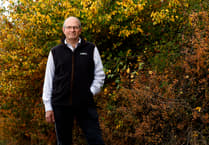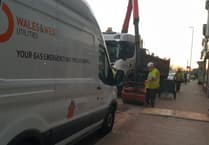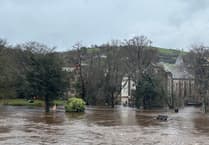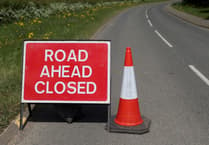Since 1863 Britannia Royal Naval College has taken pride and place looking over Dartmouth town or moored on the picturesque river Dart. Since 1998 it has been the Navy’s home for training its officers. Arriving at the college, driving through the neatly cut grass a training squad marched through the college grounds, in the college a squad marching takes priority. Like any historical institution, their leaders come and go. I went to the college to speak to their new and youngest ever Captain, at 39 years young, Andrew Bray.
Captain Bray spoke of his time in the Navy: “I joined the Navy as a logistics officer. This is my 21st year in the Navy and this is the first time I have been back to Britannia Royal Naval College. Being a logistics officer means you work across the Navy quite quickly, dealing with lots of it’s behind the scenes issues that make the Navy work. The Navy is a complex beating heart of a machine, it has people, engineering and it all requires a bit of support.
“Most recently I was the command of logistics of the HMS Prince of Wales, which is one the Navy’s two aircraft carriers.
“My favourite place to visit was South Africa, the people, the culture, the weather. The food. It was really good fun. One of the most interesting places I’ve been to is South Korea, including standing on the DMZ facing North Korea. It’s the sense of adventure that you join up for. That is what being a Navy officer is all about, standing in a place wondering how the hell you got there.”
When the Royal Navy officer training first came to Dartmouth over 150 years ago, Cadets lived and trained on HM ships moored on the river Dart. Cadets would arrive as 13 year old students looking to come complete their training to enter service in the Navy. The college as it stands today on Mount Boone opened its doors in 1905.
Captain Bray spoke of how proud he is of now leading the college, as its youngest ever Captain: “Extremely. I didn’t expect to be here, the career I followed to date meant that perhaps it wasn’t a natural conclusion that I would become the commanding officer of the college. I fundamentally believe in what a role of a Navy officer is, why it’s important and therefore why we train is important to the Navy going forward. I tell all my staff here along with HMS Raleigh, the commando training centre and all the other training establishments, Britannia is one of the Navy’s source codes. It is where everything starts no matter what ships we do and don’t have that will always remain the most important thing to me.”
The college is famously where Prince Phillip and Queen Elizabeth II first met during the Prince’s training. Upon graduating from Dartmouth, Philip was awarded the ‘King’s Dirk’ as the best in his entry.
The College has a chequered history, and this is something you’re reminded of as you enter the building, with statues and busts of Nelson as well as the replacement beams from when the college was a target during World War Two and was bombed by German aircraft during a raid on the town. The college was temporarily moved to Cheshire for the rest of the war.
Captain Bray also told me about the role of officers within the Navy: “It’s quite simple. Their role is to lead the Navy. It involves being lead too but it’s about giving the Navy all the tools it needs to deliver for you to be a fighting force and to provide a safe and secure environment for you to work and live in the UK. And a naval officer sole mission is to bring those leadership qualities to bear at sea and on the front line to lead our people compassionately and with care and attention, so that the public have the best fighting force we can provide.
“The college teaches you how to be in the Navy. We will take you to the river and put you in a boat and teach you to be a mariner. We will discipline you and put you through military training, so you see what it’s like to be a part of militarised service. All of those things have an impact on someone, and do I believe that those interventions have positive impacts on people wherever they choose to be whether in the Navy or go a different direction in life, 100%.”
Inside the college the walls are adorned with grand paintings of former Captains and naval officers, as well as former monarchs. Historic battles are also commemorated with a restored painting of the Battle of Trafalgar taking pride of place in the Captains Flat. Reminding cadets of the responsibility and standard that is expected in the Royal Navy.
The college has played an important role in Dartmouth and just as importantly is its role and relationship it has with the town. Captain Bray spoke of the unique relationship the town and college have: “The college is a huge part of this community. Not just Dartmouth the town, abut also the wider South Hams. It’s been here a very long time, over 120 years. The Navy decided to move here so it could train its officers away from the seductions of the city, places like Portsmouth and London. Today, to be able to train away from those distractions so they can focus on themselves and being the best version of themselves is an important thing. And I need the support of the community to do that, and the people of Dartmouth help me massively when they point one of my cadets in the right direction or watch their back. Dartmouth is effectively my third member of staff, and I couldn’t do without them.”
Finally, Captain Bray spoke of his memories of Dartmouth: “I distinctively remember, the camaraderie and the bond you form with people, there is no place on earth like this. There is something uniting about bringing people together from all sorts of backgrounds. I’ve got friends I made here, best friends to this day and they were all formed in this building. Because of those common experience and challenges you went through together.”





Comments
This article has no comments yet. Be the first to leave a comment.